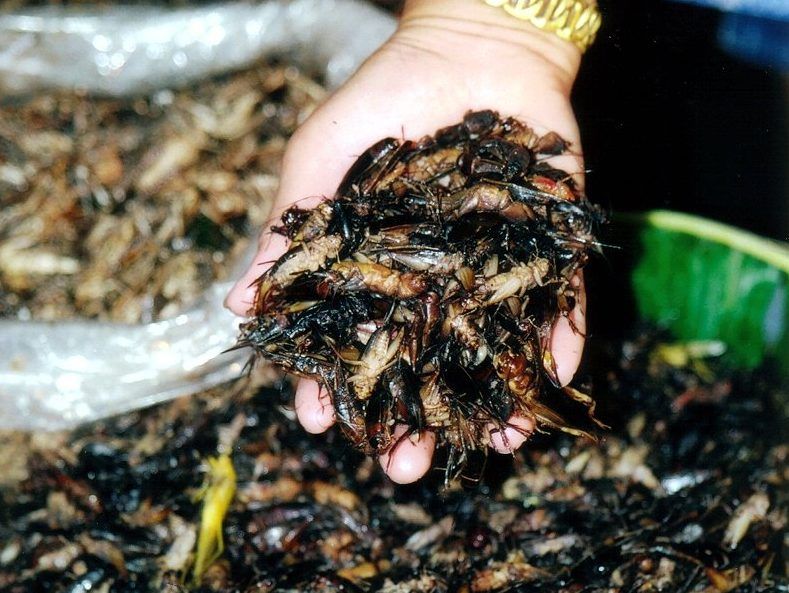Sept 11, 2023
Looks like they do want us to eat crickets after all as the Justin Trudeau government has spent millions on this idea.
There was a lot of talk on social media last year that governments around the world, in conjunction with the World Economic Forum, were pushing a diet of insects. CBC dismissed the idea as a conspiracy theory of the far right, Bloomberg did the same, as did National Public Radio in the United States.
Meanwhile, the Canadian Taxpayers Federation looked at where grants and contributions were going and found the Trudeau government has offered up $9.27 million to several companies to help them develop products. The largest contribution was $8.5 million to Aspire Food Group Ltd. through the federal government’s Agri-Innovate Program.
The stated goal of the contribution, which may or may not be paid back, is to support “the building of a commercial demonstration facility in London, Ont., to produce crickets for pet, human, biomedicine and agrochemical markets.”
Seems crickets are high in protein and, according to some, a more environmentally friendly way to get that vital component into our diets. According to Aspire, most of their cricket protein goes into pet foods, but they are looking at human consumption as well.
“Research indicates that one in five Americans have tried crickets and more than half of adults can be persuaded to consume them in their diet, a trend that continues to increase as more consumers seek healthier and environmentally superior proteins,” the company’s website says.
Some of the other companies that have received money from the federal government are already making products for human consumption using crickets. NAAK, based in Montreal, already makes cricket protein energy bars, but according to their agreement, uncovered by the Canadian Taxpayers Federation, they will be branching out into more products.
“The next project is the development of a range of products cooked with cricket powder, such as steaks, sausages and falafels,” the agreement for $48,517 with the National Research Council says.
Prairie Cricket Farms of Manitoba has received $78,000 from the feds. They promote roast cricket snacks or cricket protein sprinkled on your cereal.
Other contracts went to firms in Bromont, Que., and Scarborough, while Gaia Protein of Calgary received $160,000 “to achieve commercialization of insect protein production.”
Your money, hard at work developing the next generation of cricket farmers.
Imagine governments trying to encourage insect consumption with the help of the WEF.
And does the WEF have a role in this story? Klaus Schwab and his group have been pushing insect consumption for years. They have published several papers calling for more insect farming and consumption, calling it a solution to a growing population and a possible remedy for climate change.
GrowHop, an Ottawa-based cricket farm, is launching a campaign on Tuesday, February 23, 2016 to show Ottawans that crickets are truly all theyre cooked up to be. The company was founded in September when Andrew Afelski, 29, brought 10,000 crickets into his apartment. Afelski said he initially got the idea to farm crickets from the 2013 UN reports about insects being the future of food.
Just don’t count me in as one of the people who is going to be eating them.
Eating crickets sounds disgusting and not like something I’d try. Having our governments fund research into producing crickets for human consumptions sounds like a crazy conspiracy theory. Sadly, it’s true.
It’s also true that given inflation, especially for groceries, some people might be considering this option not out of choice, but necessity in the future.
Let them eat crickets, they said from Ottawa.

 torontosun.com
torontosun.com
Looks like they do want us to eat crickets after all as the Justin Trudeau government has spent millions on this idea.
There was a lot of talk on social media last year that governments around the world, in conjunction with the World Economic Forum, were pushing a diet of insects. CBC dismissed the idea as a conspiracy theory of the far right, Bloomberg did the same, as did National Public Radio in the United States.
Meanwhile, the Canadian Taxpayers Federation looked at where grants and contributions were going and found the Trudeau government has offered up $9.27 million to several companies to help them develop products. The largest contribution was $8.5 million to Aspire Food Group Ltd. through the federal government’s Agri-Innovate Program.
The stated goal of the contribution, which may or may not be paid back, is to support “the building of a commercial demonstration facility in London, Ont., to produce crickets for pet, human, biomedicine and agrochemical markets.”
Seems crickets are high in protein and, according to some, a more environmentally friendly way to get that vital component into our diets. According to Aspire, most of their cricket protein goes into pet foods, but they are looking at human consumption as well.
“Research indicates that one in five Americans have tried crickets and more than half of adults can be persuaded to consume them in their diet, a trend that continues to increase as more consumers seek healthier and environmentally superior proteins,” the company’s website says.
Some of the other companies that have received money from the federal government are already making products for human consumption using crickets. NAAK, based in Montreal, already makes cricket protein energy bars, but according to their agreement, uncovered by the Canadian Taxpayers Federation, they will be branching out into more products.
“The next project is the development of a range of products cooked with cricket powder, such as steaks, sausages and falafels,” the agreement for $48,517 with the National Research Council says.
Prairie Cricket Farms of Manitoba has received $78,000 from the feds. They promote roast cricket snacks or cricket protein sprinkled on your cereal.
Other contracts went to firms in Bromont, Que., and Scarborough, while Gaia Protein of Calgary received $160,000 “to achieve commercialization of insect protein production.”
Your money, hard at work developing the next generation of cricket farmers.
Imagine governments trying to encourage insect consumption with the help of the WEF.
And does the WEF have a role in this story? Klaus Schwab and his group have been pushing insect consumption for years. They have published several papers calling for more insect farming and consumption, calling it a solution to a growing population and a possible remedy for climate change.
GrowHop, an Ottawa-based cricket farm, is launching a campaign on Tuesday, February 23, 2016 to show Ottawans that crickets are truly all theyre cooked up to be. The company was founded in September when Andrew Afelski, 29, brought 10,000 crickets into his apartment. Afelski said he initially got the idea to farm crickets from the 2013 UN reports about insects being the future of food.
Just don’t count me in as one of the people who is going to be eating them.
Eating crickets sounds disgusting and not like something I’d try. Having our governments fund research into producing crickets for human consumptions sounds like a crazy conspiracy theory. Sadly, it’s true.
It’s also true that given inflation, especially for groceries, some people might be considering this option not out of choice, but necessity in the future.
Let them eat crickets, they said from Ottawa.

LILLEY: Trudeau Liberals handing out millions to help put crickets on menu
Documents obtained by the Canadian Taxpayer Federation show the Justin Trudeau Liberals are helping fund cricket farming and processing.
Last edited:










